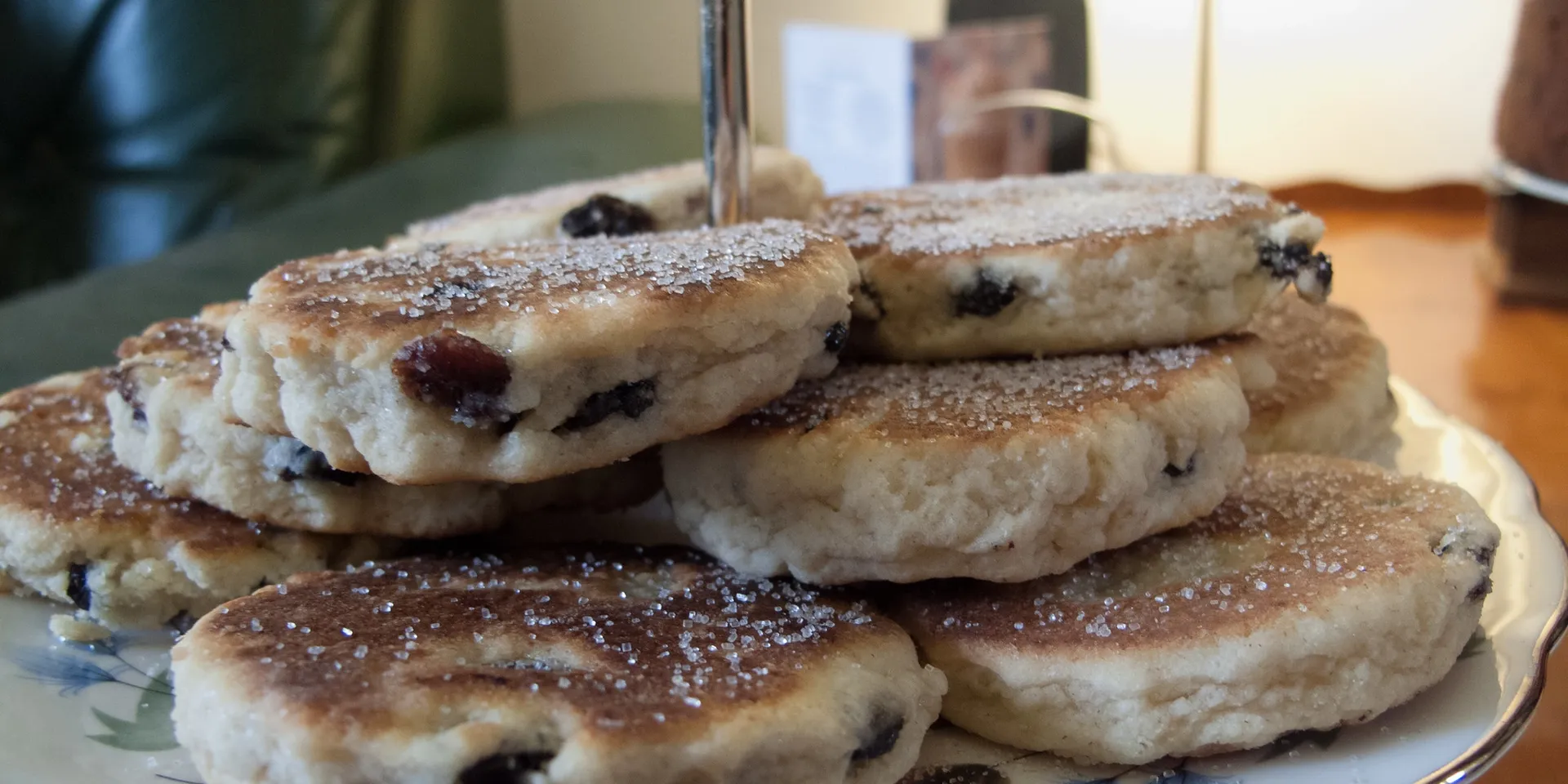Welsh cakes are traditional small cakes or buns made from a flour and butter based dough, often with raisins or currants added. They are cooked on a griddle or in a frying pan until golden brown on both sides.
What are Welsh Cakes?
Updated:

"Welsh cakes" by James E. Petts is licensed under CC BY-SA 2.0. To view a copy of this license, visit https://creativecommons.org/licenses/by-sa/2.0/?ref=openverse.
Table of Contents
Welsh cakes are a delicious combination of a biscuit and a scone with a delightful flaky texture that just melts in your mouth. Once a plain old flatbread baked on a griddle over a fire, the addition of sugar and currents made this a Wesh favorite.
Welsh cakes are quite small and are 7-8cms wide and about 1.5cm thick and typically dredged in castor sugar when still warm. The Wesh often used Welsh cakes as a workday snack and a tea-time treat.
Commercial welsh cakes are not widely spread, and enthusiasts claim they taste nothing like the home-baked variety. The recipe is simple to follow, and you can easily make the cakes at home, although a cast iron griddle is a must for these delightful treats.
Welsh Cakes History
Welsh cakes have been a staple of Welsh culture since the mid 19th century when the plain cakes got the addition of sugar and dried fruit.
Otherwise known as bakestones or pics, the Welsh cake is not really a cake in the classic sense.
Somewhat like a scone, these cakes are typically eaten just so, without being spread with jam. They are often coated in a thin layer of castor sugar and sometimes eaten with butter.
The small compact shape of the stone-baked Welsh cakes made them perfect for toting to the mines and often given to the Wesh kiddies when they went to school.
Unlike other local delicacies, welsh cakes aren't available commercially on a large scale outside of Wales, and you may not have had the pleasure of trying one yet.
Welsh families are known to pass on their secret recipes for this scone-like treat over generations of women. However, you can make them as home yourself to experience the pleasure of freshly baked Welsh cakes.
Ingredients in Wesh Cakes
Although the Welsh cake recipes hold variations according to local custom, the recipe tends to follow a conventional ingredient list.
Although many modern bakers are accustomed to using more accessible products such as butter and nutmeg, traditionalists insist that good old-fashioned lard and a hint of mace make the tastiest Welsh cakes.
Typically the ingredients of a Wesh cake are:
- All-purpose flour
- Castor sugar (not granulated, please!)
- Baking powder
- Lard
- Butter
- Egg
- Milk
- Ground mace or nutmeg
- Cinnamon
- Salt.
Welsh Cake Nutritional Information
Welsh cakes are lard and butter-based, so they are not ideal for those worried about their waistlines. However, with only 4g of fat per cake, they are not the most fattening of the sweet snacks.
Welsh cakes average about 81 calories per cake and 10.8g of carbohydrates which is half the amount found in sweet treats such as a pancake.
A typical Welsh pancake contains trace Vitamin B12 and 2.3% calcium, and 2.6% Vitamin A. Because Welsh cakes are eaten plain, you also avoid the added calories such as bitter and cream usually placed on scones.
How to Make Welsh Cakes
Wesh cakes follow a baking process similar to that of English scones. You simply mix the cold butter and lard into the dry ingredients of flour, sugar and salt spices, and baking powder until it resembles fine breadcrumbs.
You then add the currents and egg and mix to form a soft but not sticky dough which you chill in the fridge for half an hour or so.
The dough is then rolled on a floured surface to ¼ inch thick and cut out into their shapes with a biscuit cutter. Your baking surface is critical, and cast iron griddles are a must to ensure the perfect cake.
The biscuits are browned on each side on the steady heat of the griddle and then dredged in caster sugar before being ready to eat.
Traditionally the Welsh cake is eaten on its own, but you can add a layer of jam or a spread of yummy butter if you prefer a little extra indulgence.
Welsh Cake Recipes
Although traditional Wesh cakes are a firm favorite, some adventurous bakers have created several delicious variations on the original recipe. Some of these variations include:
- Dried cranberry and orange welsh cakes
- White chocolate and raspberry
- White chocolate and orange
- Vegan Welsh Cakes with coconut oil
- Coconut and Jam
- Bailey Irish Cream Welsh cakes
- Cheese and onion savory Welsh cakes
- Honey Welsh cakes.
Welsh Cake FAQ's
Welsh cakes are thought to have originated in Wales, hence the name! However, they became popular in other parts of the UK during the 19th century.
As mentioned above, welsh cakes are named after their country of origin - Wales.
There are many different recipes for welsh cakes, but the basic ingredients usually include flour, butter, sugar, eggs and milk. Raisins or currants are often added to the dough for extra flavour.
Welsh cakes have a sweet, rich flavour from the butter and sugar in the dough. The addition of raisins or currants also gives them a slightly fruity taste.
No, welsh cakes are not particularly healthy due to the high fat and sugar content. However, they can be enjoyed as an occasional treat!
This depends on the recipe used, but welsh cakes are generally quite high in calories due to the butter and sugar content.
No, welsh cakes are not vegan as they contain milk and butter. However, it is possible to make vegan welsh cakes using plant-based milk and margarine.
No, welsh cakes are not gluten free as they contain flour. However, there are many recipes for gluten free welsh cakes available online.
Yes, welsh cakes can be frozen either cooked or uncooked. If freezing cooked welshcakes, make sure to wrap them well in cling film or an airtight container.
Welsh cakes will last for 2-3 days when stored in an airtight container at room temperature. If you want them to last longer, they can be frozen (see question 10).
The main difference between welsh cakes and scones is that welsh cakes are cooked on a griddle or frying pan, whereas scones are baked in the oven. Welsh cakes are also generally smaller and denser than scones.
Yes, it is possible to make welsh cakes without eggs. There are many recipes available online that use alternative ingredients such as aquafaba (chickpea water) or flaxseed meal.
Yes, it is possible to make welsh cakes without milk by using a plant-based milk such as almond milk or coconut milk.
If you don't like raisins or don't have any at home, you can use other dried fruits such as currants, sultanas or apricots. You could also try chocolate chips!
If you don't have a griddle, you can cook welsh cakes in a frying pan over medium heat.
Yes, welsh cakes can be baked in the oven at 180 degrees Celsius for 10-12 minutes. However, they will not have the same crispy texture as when cooked on a griddle or frying pan.
Welsh cakes are cooked when they are golden brown on both sides and firm to the touch. You can also insert a skewer into the centre of the cake to check that it is cooked through.
Welsh cake crumbs can be used to decorate other cakes or desserts, or they can be sprinkled over ice cream or yogurt.
No, welsh cakes do not have to be round! You can use whatever shape cutter you like, or you can simply make them into small balls.
